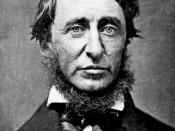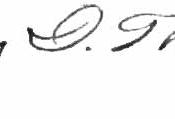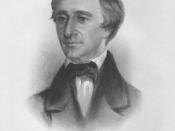The early 19th century spawned a new type of thought: transcendentalism. Introduced by Ralph Waldo Emerson and Henry David Thoreau, transcendentalists believe man as an individual can become spiritually consumed with nature and himself through experiences within nature. These ideas, however, are a starkly contrasted by Emily Dickinson, who chose to branch off this path. Dickinson believed, unlike Emerson and Thoreau, that a transcendentalist experience could be achieved without extensive natural experiences, but through imagination alone.
Emerson, Thoreau, and Dickinson were all monumental writers. Some of the best writers in American history, they set the boundaries for this new realm of thought. Although their ideas were not always similar, they all followed the thought that "the universe is composed of Nature and the Soul," with Nature playing central role in the writer's works. Thoreau states in Walking, "Here is the vast, savage, howling mother of ours, Nature, lying all around, with such beauty..."
Dickinson writes in Poem 324, "Some keep the Sabbath going to Church--/ I keep it, staying at Home--/ With a Bobolink for a Chorister--/And an Orchard, for a Dome--." These two passages show how nature plays a critical role in the lives of all three of the writer's persona.
The male perspective, however, seen through the works of Thoreau and Emerson, where nature "refers to essences unchanged by man; the air, the river, the leaf," is revised and satirized by Dickinson's statement that "Of all the Souls that stand create-/ I have elected-One." Dickinson is saying that everything might have souls, but she has decided to listen to one, hers. Dickinson's works were meant to jeer at society by showing how a woman, ironically trapped in her "natural" surroundings of the home without extensive time wandering in Nature, could obtain as much experience, if not more...



Great Essay
I have no bad comments about this essay. Well written essay with good content.
0 out of 0 people found this comment useful.